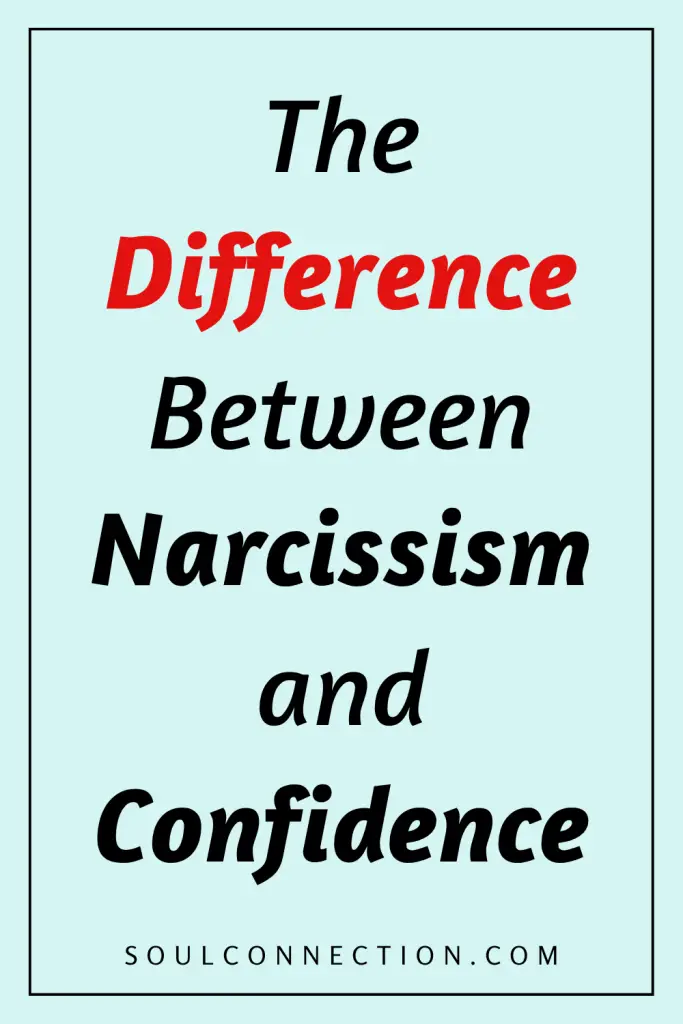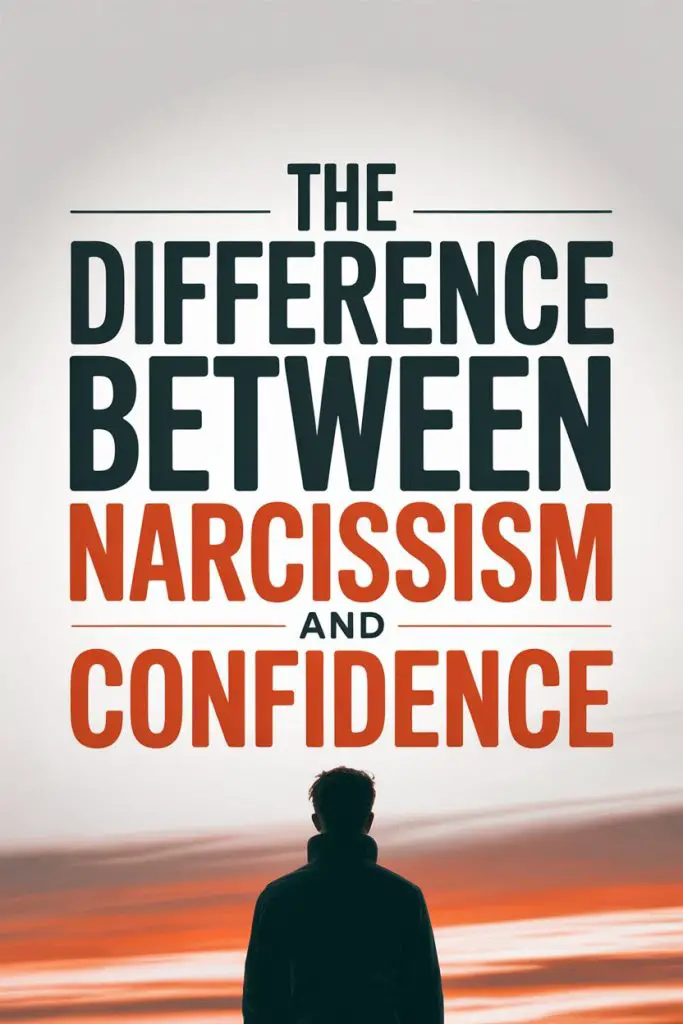People love a bit of confidence. Whether it’s the mate who tells the best stories at the pub or the date who actually makes eye contact instead of chatting up their cuticles, self-assurance is undeniably attractive.
But what happens when that magnetic charm starts to feel more like a solar flare—too hot, too bright, and you’re getting sunburned just standing nearby?
That’s where narcissism strolls in, sunglasses and all, ready to hijack the conversation and your self-esteem in one fell swoop.
Separating real confidence from narcissism isn’t just for relationship columnists and armchair psychologists; it’s a crucial skill for spotting red flags, supporting your own growth, and, let’s be honest, figuring out if you’re dating a genuinely lovely human or someone who thinks humility is a skin condition.
Where Confidence Ends and Narcissism Begins
Everyone likes to feel good about themselves (and if someone claims otherwise, they’re either in denial or have the world’s most confusing therapist). Confidence is the steady, warm energy that says, “I know my worth, and I respect yours, too.”
Narcissism, though? Think of it as confidence’s loud, self-obsessed cousin, who can’t stop checking their reflection in shop windows and expects applause for eating a sandwich.
The defining line is empathy. Confident folks don’t need to trample others to feel tall. They lift people up, share credit, and take responsibility.
Narcissists, on the other hand, treat empathy like a suspicious package—something to be avoided at all costs.
The Hallmarks of True Confidence
Confidence is about walking into a room and not needing to be the center of it. It’s the quiet conviction that you’re enough, without requiring everyone to validate it.
Confident people:
- Listen as much as they talk (sometimes more).
- Can admit they’re wrong without making a federal case of it.
- Encourage others, and mean it.
- Set boundaries without drama or guilt trips.
- Handle criticism with curiosity rather than meltdown.
You’ll spot confidence in people who celebrate your successes, let you finish a story, and don’t turn every conversation into an audition for “Britain’s Got Ego.”
The Red Flags of Narcissism
Narcissists are masters at the smoke-and-mirrors game. At first, they might appear charming, witty, and impossibly self-assured. Give it a little time, though, and cracks start to show.
Watch out for:
- ‘Me, myself, and I’ syndrome—the conversation always circles back to them.
- A deep aversion to apologizing.
- Criticism or differing opinions trigger defensiveness, anger, or the silent treatment.
- Constant need for admiration, praise, or special treatment.
- Lack of genuine interest in your feelings or experiences.
- Subtle or not-so-subtle tendency to put you down, especially if you’re in the spotlight.
If you feel more like an accessory than a partner, chances are you’re stuck with narcissism, not confidence.
Why Narcissism Gets Mistaken for Confidence
Narcissists are, tragically, quite good at faking confidence, especially at the start. Their bravado, assertiveness, and willingness to take up space can be magnetic.
In dating, job interviews, and social situations, these traits often get misread as healthy self-esteem.
The catch? Real confidence grows quieter with time. Narcissism gets louder, more demanding, and always needs topping up—like a phone battery that never holds a charge.
It’s easy to be swept up by someone who seems to know exactly who they are. But if that self-knowledge never extends to considering anyone else’s perspective, you’ve wandered into narcissist territory.
How Healthy Confidence Feels in Relationships
Confidence acts as rocket fuel for healthy relationships, not a wrecking ball. Partners with genuine self-esteem:
- Make you feel seen, heard, and safe.
- Celebrate your independence and growth.
- Admit mistakes and try to do better.
- Value your opinions without getting defensive.
- Respect your boundaries.
You’ll notice a general vibe of mutual respect. There’s space for both of you to shine. You’re not weighed down by drama, guilt, or one-upmanship.
How Narcissism Warps Relationships
A narcissist’s love is about as reliable as a British summer—glorious for a week, then endless storms.
Relationships with narcissists often follow a predictable cycle: idealization (you’re perfect!), devaluation (you’re not meeting their endless expectations), and, if you’re lucky, discard (until they need a new fan club).
Here’s how narcissism can play out:
- Your achievements are minimized while theirs are inflated.
- Emotional support is in short supply unless it’s about them.
- Manipulation and blame are on heavy rotation.
- Gaslighting makes you doubt your own perceptions.
- Their needs are always urgent; yours, somehow, are always “too much.”
You may find yourself shrinking, second-guessing, or working overtime to earn crumbs of approval. Spoiler: even a Nobel Prize wouldn’t be enough.
Building Real Confidence, Not Narcissism
We all have moments of self-doubt, and every human likes a bit of praise now and then. But building confidence that doesn’t slide into narcissism means developing a strong sense of self—without demolishing everyone else’s in the process.
Try:
- Owning your strengths and your limits (yes, both).
- Practicing vulnerability—share your real feelings, not just the Instagrammable ones.
- Listening—actually listening, not just waiting for your turn to talk.
- Apologizing without caveats.
- Asking for feedback and being open to it.
Confidence grows quietly over time. Narcissism inflates overnight and pops just as quickly.
What If You’re Not Sure?
Sometimes it’s not obvious—especially with subtle narcissistic traits or someone who’s just having a bad run. If you’re torn, ask yourself these questions:
- Do I feel drained or uplifted after spending time with them?
- Are my needs, feelings, and opinions respected?
- Can they apologize and accept responsibility?
- Is there space for compromise, or is it always their way?
Trust your gut. If you’re walking on eggshells or constantly trying to please, it’s not confidence you’re dealing with.
Advice for Dealing With a Narcissist
If you’re tangled up with a narcissist (partner, parent, friend, boss), boundaries are your new best mates.
- Keep your expectations realistic. They’re unlikely to change just because you wish really hard.
- Stand firm on what’s important to you.
- Don’t overshare your vulnerabilities; they may get used against you.
- Seek outside support—a trusted friend or therapist can help you see things clearly.
- Remember, you’re not responsible for their feelings, only your own actions.
If you’re constantly left feeling invisible, it might be time to prioritize your own well-being.
Supporting a Loved One’s Confidence Without Feeding Narcissism
Showering praise on someone isn’t the same as nurturing real self-esteem. Lift up the people around you by:
- Praising effort and growth, not just results.
- Encouraging self-reflection and accountability.
- Modeling vulnerability and humility.
- Setting your own boundaries, clearly and kindly.
Genuine encouragement helps others grow; mindless flattery just pumps up the narcissistic balloon until it bursts.
Trusting Yourself Going Forward
Spotting the difference between confidence and narcissism isn’t about playing armchair shrink or diagnosing everyone you meet.
It’s about tuning in to how you feel around someone—energetic, respected, and safe, or drained, criticized, and like you’re performing at all times.
Confidence is nourishing. Narcissism is draining. Seek out relationships that leave you lighter, not ones that have you reaching for a metaphorical raincoat.
Self-assurance that’s rooted in empathy, humility, and respect brings out the best in everyone.
And if you’re reading this and worrying you might be a bit too full of yourself, the very fact that you care? That’s a pretty good sign you’re on the right side of the line.


